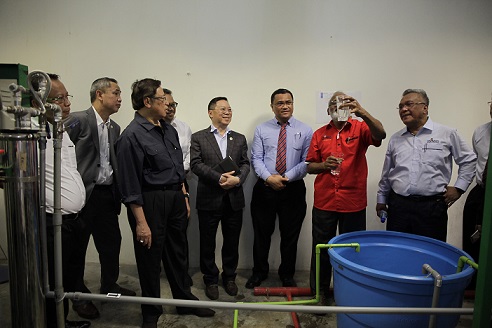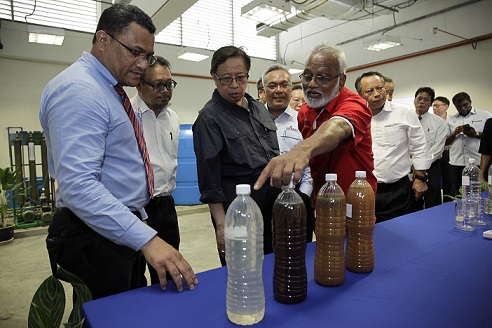Events Calendar

Kota Samarahan, 7th September 2018: Yang Amat Berhormat Datuk Patinggi Abang Haji Abdul Rahman Zohari Tun Datuk Abang Haji Openg, Chief Minister of Sarawak visited the UNIMAS Water Desalination Laboratory, situated within the university’s main campus at Kota Samarahan.
Also present during the visit are Yang Berbahagia Prof. Dato’ Dr Mohamad Kadim Suaidi, Vice Chancellor of UNIMAS; Yang Berbahagia Prof. Dr. Wan Hashim Wan Ibrahim, Deputy Vice Chancellor of Research and Innovation, and Yang Berbahagia Prof. Dr. Lo May Chuin, Director of Research and Innovation Management Centre.
The Water Desalination Laboratory is led by Prof. Dr. M. Shahidul Islam as the Principal Researcher of UNIMAS Water Desalination projects. Prof. Dr. M. Shahidul Islam is an academic staff with the Faculty of Engineering, UNIMAS and has been active in the field of water desalination since 1995.
He has been working with various national and international industries, among others and the most recent ones are Sarawak Hydro Power Plant (2015-2018) and Niagra Dying process for freshwater production by separating dissolved salts.
The main objectives of the water desalination research are firstly, to produce fresh water from saline water sources (river and sea) by using green technology and secondly, to produce fresh water from the industrial wastewater stream using zero waste discharge technology.
In addition, the current water desalination research looks into the development of the water recovery technology from palm oil mill effluent (POME). This work is in line with the waste of resources [WtR[ recovery model.
The successful outcome of the advanced POME treatment will result not only in recovering water resources but will also contribute in the generation of renewable energy including methane (CH4) and hydrogen(H2).
Subsequently, this contributes to reducing global warming potential (GWP) and climate change effects. As such, the results from this project contributes to safeguarding Sarawak's natural resources and environment while at the same time, contributes to the economic growth of the state.


